Key insights from the 10 Year Event
We have collected the key learnings from all Partnership Panels and Innovation Labs. Click the session below to go to the reflections.
Partnership Panels
- Cocoa & Forest initiative
- Finance for Landscapes
- Smallholder Value Chain Finance
- The future of Food and Retail
Innovation Labs
- Digital innovations to improve farm performance and value chains
- New frontiers in sustainable manufacturing
- Catalyzing Change: India – Secure Responsible Sourcing
- Prosperity and jobs: value chain development – Africa
- Making living income the outcome
- Working towards a joint agenda for living wages
- Investing in Smallholder profitability
- A new sustainable market mechanism : Verified Sourcing Areas
- IDH4Gender : where does the evidence take us ?
Plenary morning sessions and welcome speeches
Introduction by Joost Oorthuizen, Chief Executive Officer and Chairman of the Executive Board of IDH.
 © Jonathan Perugia/Gaia Visual Ltd
© Jonathan Perugia/Gaia Visual Ltd
Joost Oorthuizen speech started with a warm welcome to all the attendees, followed by some highlight achievements of IDH and the role partnerships play in those results.
‘We work with our magic triangle convening & shaping of partnerships, learning & innovating and co-financing with the market to reach scale’.
Speech by Her Majesty Queen Máxima of the Netherlands, UN Secretary-General’s Special Advocate for Inclusive Finance for Development.
 © Jonathan Perugia/Gaia Visual Ltd
© Jonathan Perugia/Gaia Visual Ltd
Her Majesty Queen Máxima of the Netherlands addressing a powerful message on smallholder’s access to finance in developing countries. Amongst others Queen Máxima asked the question: ‘When the products of smallholders end up so easily on our tables. Why is it so difficult for us to reach the tables of smallholder farmers?’
Speech by Sigrid Kaag, Minister for Foreign Trade and Development Cooperation, the Netherlands.
 © Jonathan Perugia/Gaia Visual Ltd
© Jonathan Perugia/Gaia Visual Ltd
Minister Sigrid Kaag announced that private sectors, governments and NGO’s will invest together in profitable value chains through the IDH Farmfit Fund and Farmfit Business Support. She pledged for women to be given a central role as leaders and participants.
Minister Kaag also talked positively about IDH: ‘There is the question on how reachable the SDGs are? IDH is probably one of the answers.’
Launches
Farmfit Business Support and Fund
 © Jonathan Perugia/Gaia Visual Ltd
© Jonathan Perugia/Gaia Visual Ltd
IDH launched together with the Bill & Melinda Gates foundation and DIFD, and with the Rabobank, JDE, Unilever, Mondelez, USAid and the Dutch government respectively the 30M USD IDH Farmfit Business Support and the 100M EUR IDH Farmfit Fund.
Learn moreVerified Sourcing Area presented by Daan Wensing, Director of Landscapes Program at IDH, The Sustainable Trade Initiative.
 © Jonathan Perugia/Gaia Visual Ltd
© Jonathan Perugia/Gaia Visual Ltd
Director of the Landscape Program Daan Wensing, launched the world’s first Verified Sourcing Area (VSA) pilot in Mato Grosso in Brazil together with Stéphane Engelhard, Executive Director of Institutional Relations, Communication and Sustainability of Carrefour Brazil , Jennifer Morris, President of Conservation International and Mauro Mendes, the Governor elect of the Mato Grosso.
Learn morePartnership Panel A – Cocoa and Forest Initiative
Key insights
Last year an unprecedented partnership was convened by ISU, IDH and WCF, creating the Cocoa & Forests Initiative (CFI). CFI is an active commitment of cocoa-producing countries Côte d’Ivoire, Ghana and Colombia with leading chocolate and cocoa companies. In each country, far-reaching Frameworks for Action have been signed to end deforestation and restore forest areas.
The High Level Panel brought together CEOs of CFI signatory companies, Ministers from Ghana and Cote d’Ivoire, as well as the heads of Rainforest Alliance and the Swiss State Secretariat for Economic Affairs, to discuss CFI progress to date, challenges in implementation, and engage in the discussion on how government, private sector and other stakeholders can take the next steps towards impact.
Panelists highlighted the range of actions already undertaken in Côte d’Ivoire and Ghana, such as the mapping of farms using farm polygons, the development of agroforestry models or measures to support productivity. They however mentioned a number of challenges still to be addressed, such as alignment on the agroforestry and reforestation schemes to promote, the need to engage with communities, as well as the absolute necessity to mitigate the social impacts of possible resettlement of illegal farmers. These are all topics where further collaboration will be needed in 2019.
The main takeaway is that there is strong alignment between companies and government on the plans, the priorities to address, and the fact that civil society engagement is critical to success. Finance is however still an issue to address, and there will be a need to ensure that resources can be rapidly mobilized so that CFI moves from planning to implementation.
Next steps: 2019 will be a critical year for implementation. Early 2019, companies will release their action plans, and will then join forces with government and civil society to focus on on-the-ground impact.




Speakers who joined this session :
-

Sir Graham Wynne
Board member at the Institute for European Environmental Policy
Facilitator
-

Kim Frankovich
Vice President of Cocoa Sustainability for Mars Wrigley Confectionery
-

Ambassador Raymund Furrer
State Secretariat for Economic Cooperation and Development (SECO) Switzerland
-

Han de Groot
Chief Executive Officer of the Rainforest Alliance
-

Gbogou Didier Lohoury
Chief of Staff, Ministère des Eaux et Forêts - Côte d'Ivoire
-

Hon. Benito Owusu-Bio
Deputy Minister of Lands and Natural Resources, Ghana
-

Harold Poelma
President of Cargill Cocoa and Chocolate
-

Antoine de Saint-Affrique
Chief Executive Officer of Barry Callebaut
Partnership Panel B – Finance for landscapes
Key insights
In the panel on finance for landscapes three key highlights were identified.
First, for investments to generate long-term environmental returns and enable sustainable landscapes, the importance of partnership was stressed. To be successful all relevant stakeholders need to be involved. Stakeholders in a landscape, whether companies, governments, communities, farmers or civil society organizations, often have different strengths, as well as interests, and therefor each have specific roles to play. Jennifer Morris – President of Conservation International, explained how in conservation finance “radical partnerships are critical”, and Sunny Verghese – CEO of Olam International stressed that “If there is one missing actor, you will not be successful”. Panellists also highlighted that projects in areas with government support/alignment have a higher chance of being successful, and can often work at a faster pace.
The second key take away from the panel was on the need for diversified finance. To be relevant, the financial solutions need to fit the financial needs of the context. While that sounds simple, panellists highlighted that in practice, this is often not yet the case. Besides looking at the landscape financial needs, the needs of farming households should also not be overlooked. There was wide agreement that ‘the farmer needs to be seen in totality – as a household, not just the farming part’. Sylvian Goupille, Managing Director of Althelia Funds, explained that solutions that are built to fit the local context can still reach scale: “Take a Bottom-up approach and always look for scale”.
Finally, panellists called for data-based approaches. Berry Marttin, Member of the Managing Board of Rabobank, here highlighted Rabobank’s new environmental performance rating scheme, to be mainstreamed into credit scoring practices of the bank, so that the bank can monitor the environmental performance of its investees and offer financial incentives to clients that perform well. “Good environmental practice lowers financial risk”, he stressed. In the same line, Patrick Njoroge – Governor of the Central Bank of Kenya – said: “The farmer sometimes does not see the benefit of sustainable agriculture in the long term – that is where the banks come in” With improved data on the long term benefits of improved landscape management, the ‘business case’ will become increasingly evident, and can also lead to new incentives.



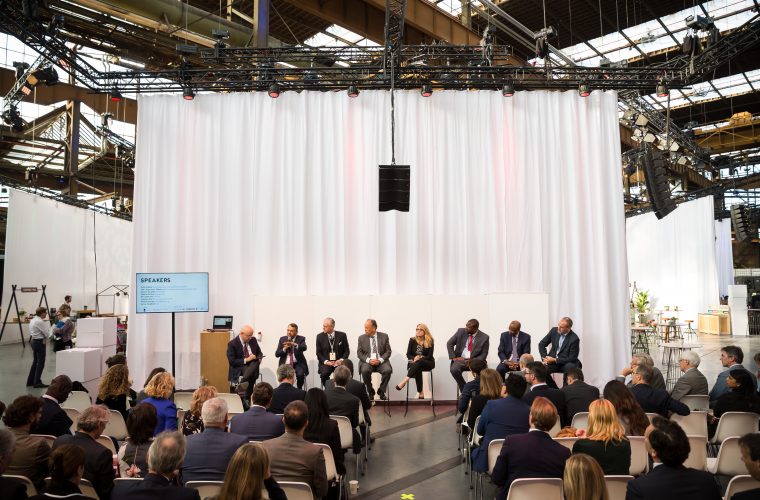
Speakers who joined this session :
-

Peter Bakker
President of the World Business Council for Sustainable Development
Facilitator
-

Hon. Augustus J. Flomo
Deputy for Economic Management, Liberia
-

Sylvain Goupille
Managing Director Althelia funds
-

Nanno Kleiterp
Chairman of the Board at &Green fund
-

Berry Marttin
Member of the Managing Board
Rabobank
-

Jennifer Morris
President of Conservation International
-

Patrick Njoroge
Governor of the Central Bank of Kenya
-

Sunny Verghese
Chief Executive Officer of Olam; Chairman of the World Business Council for Sustainable Development
Partnership Panel C – Smallholder Value Chain Finance
Key insights
In the Partnership Panel smallholder value chain financing it was discussed that the smallholder finance landscape is changing, as innovative value chain solutions are becoming available. In the session key actors from the private sector as well as financial institutions participated and gave their analysis on what has changed and what more is needed to close the financing gap for smallholders.
Four key learnings were identified during the session. Farmer finance is becoming increasingly possible because of innovation and technology. Mobile money, credit scoring tools and data driven solution plays an important part in assessing credit risk of farmers. Moreover, the banking model has changed and is now more inclusive as new technological possibilities have appeared. “The use of technology should be leveraged to put together a new ecosystem with players from the industry to make pricing of finance products to farmers more affordable”.
Concerning Investment in agriculture, a long-term holistic approach is needed to enable farmers to have access to markets, inputs and financial products that allows them to invest in their farms. Financial products that are tailored to farmers are key to drive change.
“Another factor that has changed is the awareness of society and banks towards the environment. Sustainability is a tremendous focus of banks nowadays, and banks feel the responsibility to work with clients to improve the financing of their suppliers, being smallholders.” Friso Koopmans, Managing Director, Global Head Agri Commodities at ABN AMRO.
“Policy reform that supports public-private sector investment is critical. Public-private partnerships are important so that changes can be taken to scale.” Beth Dunford, assistant to the Administrator for Food Security at USAID.
IDH launched Farmfit on November 15th, a facility that helps companies with smallholder farmers as clients, develop viable business models that result in shared value. IDH will further expand its holistic approach and seeks collaboration with technological partners in order to create platforms that will enable farmer delivery solutions to scale.




Speakers who joined this session :
-

Beth Dunford
Vice President for Agriculture, Human and Social Development
African Development Bank Group
-

Andrew Halle
Chief Executive Officer of Ecom
-

Svein Tore Holsether
President and Chief Executive Officer of Yara International
-

Friso Koopmans
Managing Director, Global Head Agri Commodities at ABN AMRO Bank N.V.
-

Dr. James Mwangi
Group Managing Director and Chief Executive Officer of the Equity Group Holdings Limited
-

Mahesh R. Patel
Chairman of the Board of Export Trading Group S.A
Partnership Panel D – The Future of Food and Retail
Key insights
In the sustainability debate, retailers play an important role in their direct connection to consumers. Acknowledging this formed the starting point of the panel discussion. It emerged that while consumers increasingly request supply chain transparency and healthier and more sustainable products, in their everyday consumption patterns this is not always reflected. With the exception of the younger generation, consumers are busy and lack the time and energy to follow through with informed choices. Therefore, there is an important role for retailers to take the responsibility to improve practices across supply chains on behalf of consumers. More sustainably-produced products, sold at a premium price, have often been the chosen path, however, these are typically niche products that result in limited impact “around the edges”. To have impact at scale, sustainability needs to be integrated into retail business principles and products must be price-competitive. To do this, retailers need to build data-driven approaches to understanding their supply chains and strengthen collaboration with all players across their supplier base.
It was acknowledged that more sustainable retail strategies provide opportunities for market differentiation, often with a clear business case. However, retail value chains are complex and broad-reaching: collaboration and joint learning between retailers are crucial to overcoming shared challenges, particularly in addressing extensive issues like the payment of a living wage and deforestation. A case in point is the adoption of a collaborative approach to living wages by the members of the Dutch Retail Association through a series of pilots in banana and coffee supply chains, announced in this retail panel discussion. The Dutch and Danish government representatives expressed their willingness to support the retail sector in the adoption of more sustainable practices, and explained the development of initiatives to create the right enabling environment – the P4G – Partnering for Green Growth and the Global Goals 2030 – initiative and the promotion of Dutch sector covenants.
Sonia Cordera, Program Manager Fresh and Ingredients, said: “In the past 10 years of its existence, IDH has successfully collaborated with retailers in different programs, like the one on sourcing sustainable fresh fruit and vegetables or the landscape programs. Considering their crucial role, IDH is interested in facilitating retailers’ participation in its programs even more in the future and in co-designing with them approaches to mainstream sustainable sourcing and production”.
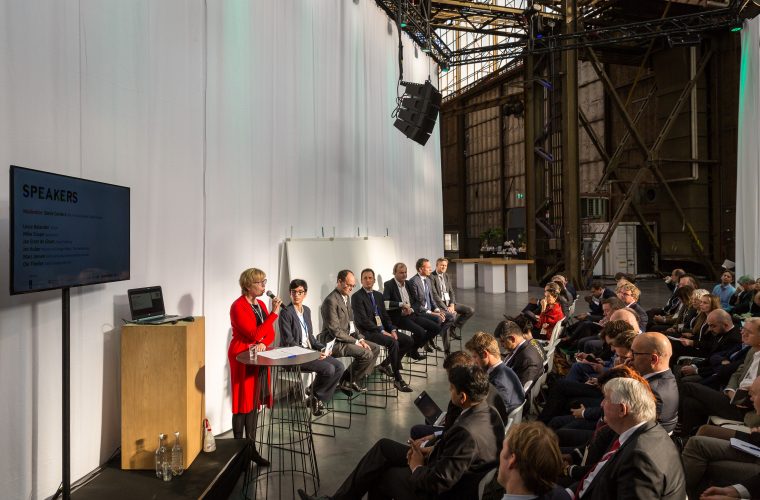




Speakers who joined this session :
-

Chair of the Roadmap on Living Wages Steering Committee; Deputy Director at IDH
Sonia leads a team of professionals responsible for the aquaculture, flowers and plants, fruit and vegetables, juice, nuts and spices sectors and is responsible for the IDH living wage approach. She chairs/represents IDH in the Boards of the different sector and thematic initiatives with the aim of steering the industry towards the uptake of sustainable social and environmental practices.
-

Mike Coupe
Chief Executive Officer of Sainsbury's
-

Jan Ernst de Groot
Chief Legal Officer
Ahold Delhaize
-

Jos Huber
Senior policy advisor at Ministry of Foreign Affairs, The Netherlands
-

Marc Jansen
Director of the Centraal Bureau Levensmiddelenhandel
-

Ole Thonke
Head of Department for Growth and Employment, Danish Foreign Ministry
Launches
Dalberg and IDH launched a strategic partnership on agriculture value chain development and commercialization.
 © Jonathan Perugia/Gaia Visual Ltd
© Jonathan Perugia/Gaia Visual Ltd
The Vietnam Ministry of Agriculture and Rural Development (MARD) gave to IDH a Government Medal, as the recognition of IDH’s contribution to the sustainable development of agriculture sector in Vietnam in the past 10 years.
 © Jonathan Perugia/Gaia Visual Ltd
© Jonathan Perugia/Gaia Visual Ltd
Launch of the Land Degradation Neutrality Technical Assistance Facility (LDN TAF).
 © Jonathan Perugia/Gaia Visual Ltd
© Jonathan Perugia/Gaia Visual Ltd
Innovation Lab A - Digital innovations to improve farm performance and value chains
Key insights
During the Innovation Lab ‘Digital Innovation to improve farm performance in value chains’ there were two central themes with each a group of experts discussing the topic. In the first group Laura Falk from Sainsbury’s and Nicolas Tamari from Sucafina discussed the trends and priorities in agriculture technology. One of the questions raised was how we can strengthen the links between farmers, businesses and the consumer. The second group focused on how financial technology can be used to strengthen financial inclusion. As speakers Laura McKenzie from Mastercard, Carolina Eikenberg from NKG and Grégoire Danel-Fédou of Advans joined.
Key takeaways. During both sessions a lot of emphasis was on trust and closing that trust gap. Do farmers trust the technology that they use? Do they trust their partners? And their invisible money? It became clear that acceptance and accessibility of mobile money in the local context is critical to its success. If farmers can’t use it in their communities, it will not work. Furthermore, the role that technologies such as digital ID and blockchain can play in building this trust between groups was reflected on.
A broader dialogue covered new products and approaches that are coming to the market including cards and alternate credit providers. Tied to this was the question how we can take advantage of developed markets and introduce technologies in developing markets. Last, existing platforms were discussed and especially how this technology and the knowledge can be aggregated. Two examples that were mentioned: the Digi-farm platform, that brings together different sorts of technology through mobile operators, and the Farm-Market Alliance, which horizontally connects larger companies to go to the market together.
The feedback from the session was gathered and will serve as input for the technology strategy that will roll out in 2019. Follow ups with participants to get their continued feedback will take place to continue building an agenda that is supportive of market drivers and that aligns farmer livelihood with strong business performance.



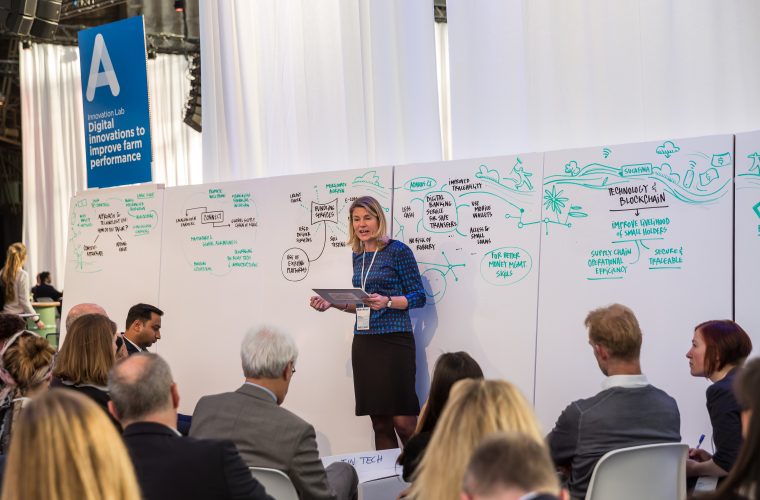
Speakers who joined this session :
-

David Rosenberg
Moderator
-

Paul Moseley
Program Officer at Bill & Melinda Gates Foundation
Moderator
-

Grégoire Danel-Fédou
Chairman of the Board of Advans CI, and Chief Operating Officer of Advans Group.
-

Catalina Eikenberg
Head of Sustainable Business at Neumann Kaffee Gruppe
-

Laura Falk
Group Sustainable Sourcing Manager
Sainsbury's
-

Tanja Gonggrijp
Management Team Member, Department for Sustainable Economic Development at the Ministry of Foreign Affairs, The Netherlands
-

Laura Mackenzie
Senior Vice President Global Prepaid & Financial Inclusion at Mastercard
Innovation Lab B - New frontiers in sustainable manufacturing
Key insights
During the Innovation Lab on New Frontiers in Sustainable Manufacturing, we have discussed how fashion brands and retailers can join forces to abolish dangerous or otherwise unacceptable working conditions in the fashion manufacturing industry, especially related to structural, electrical, and fire safety. IDH and the brands have explained the programs that have been created to address root causes, with build-in economic incentives for manufacturing industries to improve their practices. Jeffrey Hogue, Chief Sustainability Officer at C&A, brought a pair of jeans as well that is completely Cradle to Cradle Certified at the Gold level. The jeans have been designed in partnership with Fashion for Good, a global platform that aims to make all fashion good, and the jeans is made with completely sustainable materials and is produced in compliance with the high Cradle to Cradle Certified Gold level. A clear example that sustainably produced fashion is possible. It is however key that high-impact programs reach scale as well. Therefore, IDH is one of the co-founders of the Apparel Impact Institute. Through this Institute collaboration is designed to work with brands and manufacturers to select, fund, and scale projects that considerably improves the sustainability impact of the apparel and footwear industry.
Key takeaways of the session are summarized in the scribing below.


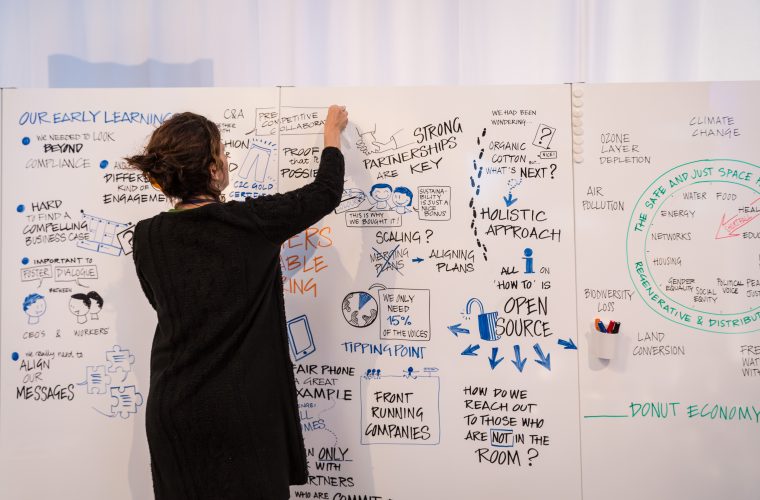


Speakers who joined this session :
-

Jeffrey Hogue
Global Chief Sustainability Officer of C&A
-

Jason Kibbey
Chief Executive Officer of the Sustainable Apparel Coalition
-

Lewis Perkins
President of the Apparel Impact Institute
Innovation Lab C - Catalyzing Change: India - Secure Responsible Sourcing
Key insights
The global business scenario is fast changing. Growing awareness about sustainability risks and opportunities is making accountability and transparency increasingly important to the consumers, investors, and other stakeholders. As India continues to increase its footprint as a key sourcing and consuming country across a number of supply chains, it is strategically positioned to take a leading role in promoting responsible sourcing.
The “Responsible Sourcing” session represented different stakeholders in value chain as panellists. Opportunities for a new potential based on sustainable and inclusive growth in India were explored.
A number of key takeaways were identified during the session.
- Responsible sourcing cannot just be ‘sourcing from’ farmers, but also ‘sourcing to’ the farmers. Standardization in inputs sold to the farmers is required. Farmer profitability must be the focus of agricultural interventions.
- Farming needs to be consider as a profession, there is a need to move away from a development discourse, greater representation to design fit for purpose solutions.
- It is important to have metrics for measuring responsible sourcing and sustainability.
- Companies are increasingly working on sustainability in their supply chains because of their brand values, long term survival, supply chain control, transparency and there is a business case of in investing in being sustainable.
- Consumers are key influencers in value chains as their values, needs and opinions will affect the decisions brands make. Companies can help engage consumers in promoting sustainable behaviour by marketing to young people in India, putting carbon footprint of the product on its packaging.
- Policy and programs designed to support farming as a viable livelihood option for the youth of the country and provide enabling factors such as Finance, market intelligence, demand forecast, etc.
Next Steps:
• Support high-level partnership with identified Governments, Foundations, Institutions, companies, advocating responsible public policies and practices for sourcing.
• Position IDH India as an enabling factor for achieving responsible sourcing by partnering with organizations working on program-related SDGs. This is to be achieved by providing advisory services related to energy, water, chemical by-products, plastic waste management, emissions, to enhance climate resilience in value chain.
• Identification of funder organizations funding responsible sourcing agenda

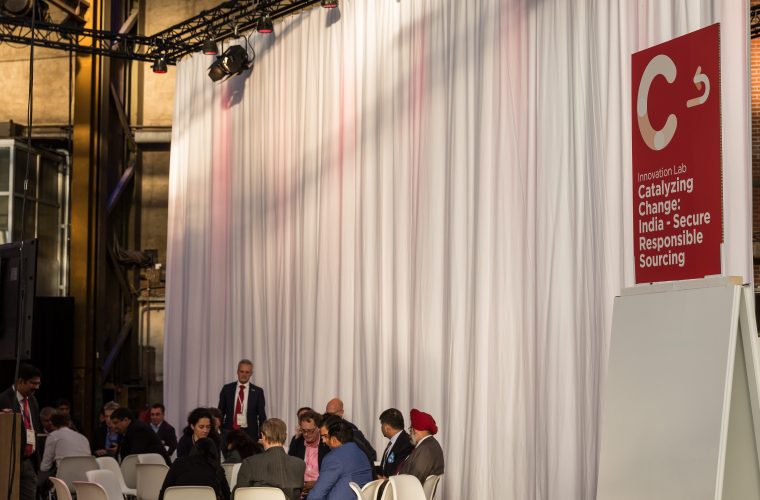


Speakers who joined this session :
-

Santhosh Jayaram
Partner and Head of Sustainability and CSR Advisory at KPMG
Moderator
-

Ajay Vir Jakhar
Chairman, Bharat Krishak Samaj (Farmer’s Forum) and Punjab State Farmers Commission, India
-

Michael Kobori
Vice President of Social and Environmental Sustainability at Levi Strauss & Co
-

Sanjiv Rangrass
Divisional Chief Executive of Agri Business Division at ITC Limited
-

Satya Tripathi
Assistant Secretary-General & Head of New York Office of the United Nations Environment Programme (UNEP)
Innovation Lab D - Prosperity and Jobs: value chain development - Africa
Key insights
African SMEs lack access to global markets as they are not yet reaching commercial scale, and do not have access to market linkages. The goal of this innovation lab was to explore the role that governments, multinational corporations, and financial institutions can play in developing inclusive commercial value chains in Africa. The discussion highlighted several important topics. SMEs face a number of challenges, most important of which include working within unreliable supply chains, lack of access to affordable finance, and meeting formal market requirements (with regards to quantity, quality and compliance standards). Without the support of government, many successful SMEs remain pilots; government needs to reinvest in extension services, facilitate a stable policy environment, and develop a framework for effective public-private engagement. Multinational corporations need to work flexibly with SMEs, understanding SME supply constraints, and develop scalable platforms to aggregate farmers and invest in value chains. Financial institutions can use better supply chain and farmer data to improve risk profiling and build better transparent collaborations across supply chains to reduce the cost of credit for all players. A key objective at IDH is driving prosperity and growth in Africa through the strategic development of commercial agricultural value chains. The session provided valuable lessons for IDH’s future engagements.




Speakers who joined this session :
-

Nneka Eze
Nneka is a General Partner and Managing Director at VestedWorld, an impact-focused early-stage fund, where she has served on the Investment Committee for four years. She also serves on the board of the Impact Investors Foundation of Nigeria and Nigeria's National Advisory Board for Impact Investing.
-

George William Kayonga
Chief Executive Officer of the Rwanda National Agriculture Export Board (NAEB)
-

Dorcas Onyango
Head of Sustainability, Southern & East Africa Business Unit
Coca-Cola Africa PTY
-

Momarr Taal
Founder of Tropingo Foods
-

Affiong Williams
Founder and Chief Executive Officer of Reelfruit
Innovation Lab E - Making living income the outcome
Key insights
In the Living Income Innovation lab, participants were incited to think beyond methodologies and benchmarks to consider what action can be taken to support smallholders to achieve a living income. Kim Frankovich, VP of Cocoa Sustainability for Mars Wrigley Confectionery; Martina Gaebler, Team Lead on Sustainable Cocoa at GIZ’s Programme Sustainable Agricultural Value Chains; and Carla Romeu Dalmau, Senior Manager, Learning and Impact Research at IDH, shared their respective approaches to tackling the subject. Inspired by these introductions, six lively break-out discussions illuminated the interconnectedness of problem areas and critical factors that will enable change. The main takeaway message is that achieving Living Income is a process requiring engagement across all stakeholders in the value chain, from farmers through to retailers and even financiers. Critical to achieving change is broaching complex and sensitive subjects such as price and value distribution along the chain; harmonizing local, regional and global policy; farmer segmentation and the limitations of land size; and enabling farmers to maximize their land’s potential through improved productivity, multi-cropping and access to services.
Next steps: GIZ supports two Living Income initiatives, the Community of Practice and the Task Force; Mars is expanding the efforts of its Farmer Income Lab; and IDH is a Task Force member and is actively collaborating with the private sector to change business and field-level practices to close the income gap.




Speakers who joined this session :
-

Lucas Simons
Founder of NewForesight and SCOPEinsight
Facilitator
-

Kim Frankovich
Vice President of Cocoa Sustainability for Mars Wrigley Confectionery
-

Senior Innovation Manager, Better Jobs at IDH
Carla Romeu-Dalmau works towards achieving structural change to reduce poverty in supply chains. She holds a PhD on Agricultural Ecology from the Autonomous University of Barcelona (UAB) and a MSc in Sustainability Studies and Ecological Economics from the Institute of Environmental Science and Technology (ICTA). She has published twelve publications on agriculture, sustainability, ecosystem services and poverty.
-

Dr. Stefan Schmitz
Deputy Director-General for Food, Rural Development and Natural Resources at BMZ.
Innovation Lab F - Working towards a joint agenda for living wages
Key insights
In the session ‘Working Towards a Joint Agenda for Living Wages’ four companies shared their experiences in working towards living wages, sharing their lessons learnt on practically implementing a living wage in their supply chains. Examples where given from the banana’s, tea, flowers and avocado supply chains. The Dutch government and ILO reflected on these contributions and shared their view on living wage as well. The discussions highlighted the complexities surrounded with living wage implementation. It’s not as simple as just paying higher prices to estates or asking consumers to pay more. The main challenges included the following:
- Single country focus and single supply chain focus has its limits: producing countries ask for level playing field. And retailers/buyers come to the conclusion that they can’t impact living wage alone as they rarely source 100% of the supplier output.
- Balancing job quality, quantity and competitiveness is tricky. Key that wages increases will go hand in hand with increase in quality and yields. Too fast increasing wages might lead to mechanization as competitiveness is at stake. Also, in some countries mechanization will lead to loss of license to operate.
- Different timescales: for producers to prepare for living wage, they need to reinvest heavily, for example in replanting. This can have timescales of 20-50 years. Whereas buyers can move away tomorrow and source somewhere else.
- Concerns on anti-trust regulations: living wage can be about price, and how to discuss that properly within the confines of antitrust regulations
- How to share the burden of living wage fairly amongst supply chain actors? What consumer facing communication be to generate more value?
Next steps
Living wage will become an even more important area of focus for IDH across different sectors. IDH will put more resources into standardizing its interventions on living wage, including the development of sector wide living wage dashboards and sense making of transition paths to living wage. For several commodities such as flowers and bananas we will aim to organize European retail demand, starting with the Dutch retailers under the IMVO covenant, and reaching out to German and British retail.





Speakers joining this session :
-

Tony Bruggink
Global Director IDH Food Crops & Ingredients
-

Will Battle
Senior sustainable procurement advisor, and former tea buyer
IDH
-

Julie Cournoyer
Global Director Sustainability
Fyffes
-

Jos Huber
Senior policy advisor at Ministry of Foreign Affairs, The Netherlands
-

Michel van den Bogaard
Chief Financial Officer
Afriflora
-

Innovation Lab G - Investing in Smallholder profitability
Key insights
During the Innovation Lab on Smallholder Profitability, it has been discussed what different players can do to establish, grow and finance inclusive and sustainable farmer business models. Dr. James Mwangi, CEO of Equity Bank Kenya and Dr. Ndidi Nnoli, Group Chief Sustainability & Governance at Dangote have shared their experience in working towards inclusive and sustainable farmer business models, using data-driven evidence. During seven breakout sessions, participants discussed what is needed to make inclusive and sustainable business models a success at scale. The main takeaway message is that there is a need for a mindset shift from seeing farmers as a supplier to farmers as clients and risk-taking entrepreneurs. Sustainable business models at scale require a tailored approach and data-driven approach that focuses on the entire farming system and ecosystem of actors. Digitalization and mechanization are crucial to assure better land use and market-driven farmer segmentation. To achieve success, a long-term approach is needed that leverages innovative finance schemes (e.g. smart subsidies) and patient capital to de-risk smallholder farmers and unlock smallholder profitability at scale.
The next step is a verbal commitment by Equity bank to conduct an SDM analysis as part of the partnership engagement of IDH with the Mastercard Rural and Agriculture Finance Lab (RAF-LL), starting in the first trimester of 2019.



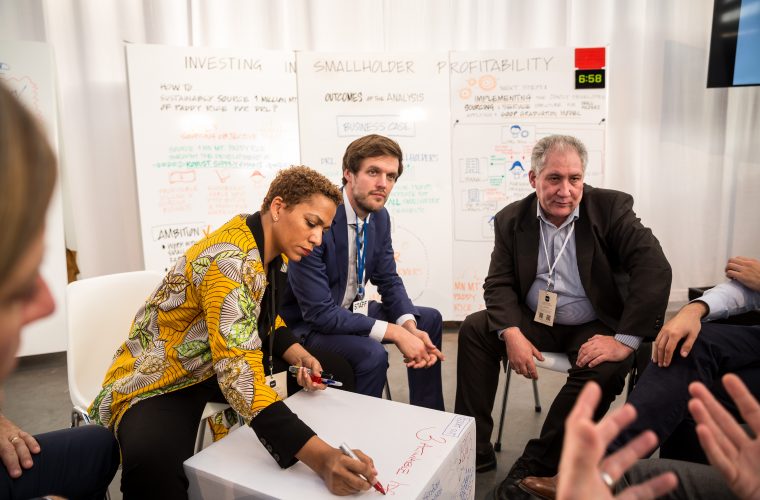
Speakers who joined this session :
-

Former Global Director Learning and Innovation
-

Aviva Kutnick
Private Sector Engagement, Foreign Service Officer at USAID
-

Andrew Halle
Chief Executive Officer of Ecom
-

Thomas Kehoe
Deputy Director Agriculture at Bill & Melinda Gates Foundation
-

Mary Munyiri
Chief Executive Officer of ECLOF Kenya
-

Dr. James Mwangi
Group Managing Director and Chief Executive Officer of the Equity Group Holdings Limited
-

Patrick Njoroge
Governor of the Central Bank of Kenya
-

Dr. Ndidi Nnoli-Edozien
Group Chief, Sustainability & Governance at Dangote Industries Limited
Innovation Lab H- A new sustainable market mechanism : Verified Sourcing Areas
Key insights
At the VSA session, the discussions were based around five different stakeholder groups: consumers, NGOs, governments, financiers or retailers, brands and businesses. Fernando Sampaio, executive director of the PCI strategy in Mato Grosso, explained the link between PCI and VSA and Cristine Daugherty of PepsiCo explained the relevance of VSAs for their company. The new environmental secretary of Mato Grosso underlined the state’s commitment to pursue PCI. Reflecting on how the concept of VSAs can be further improved resulted in three focus points: the market, monitoring and verification, and the link to existing initiatives.
The business proposition of VSAs needs to be further clarified. The system needs to be rigid enough to withstand criticism. The discussion resolved around several points including that a reinvestment and feedback loop concept should be developed that ensure sustainable long-term investment, that the VSA should be an investible entity, and ensuring support by NGOs to guarantee investment by financiers. It was noted that the downward pressure of the market concerning prices must be calculated in; these and other costs need to be internalized as a cost of doing business.
The monitoring and verification scheme of VSAs needs to be further developed. Especially the purpose of the Global Performance Standard should be clear. Other questions raised related to this were how smallholders will be monitored, and how to develop an audit on the landscape scale which involves all stakeholders. It was stressed that KPIs should be relevant to the farmers, and that there is a clear link between performance and reward.
Participants and speakers agreed that there was a need to clarify how VSAs are aligned with other landscape and certification initiatives to determine how the VSA could reduce the complexity of other certification standards and link it to existing international commitments.
Finally, the relevance of VSAs to consumers was discussed. The added value of a VSA should be clear to consumers – it should not be just another label. Consumers want to trust brands and VSAs have the potential to provide a platform for brands to prove their claims.
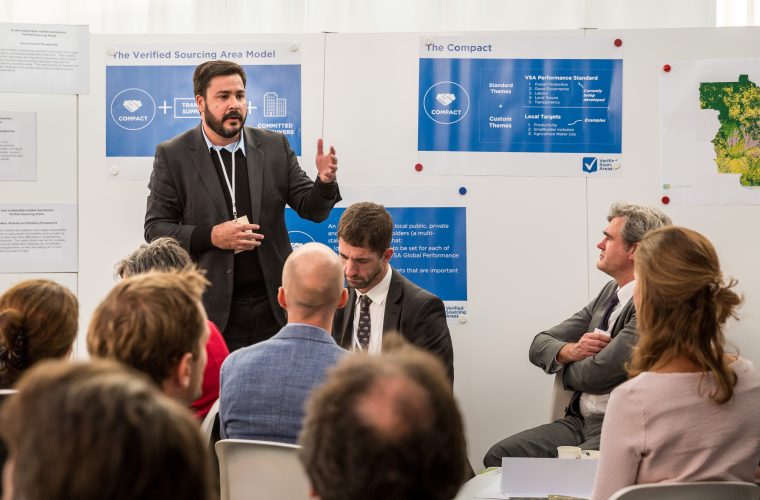

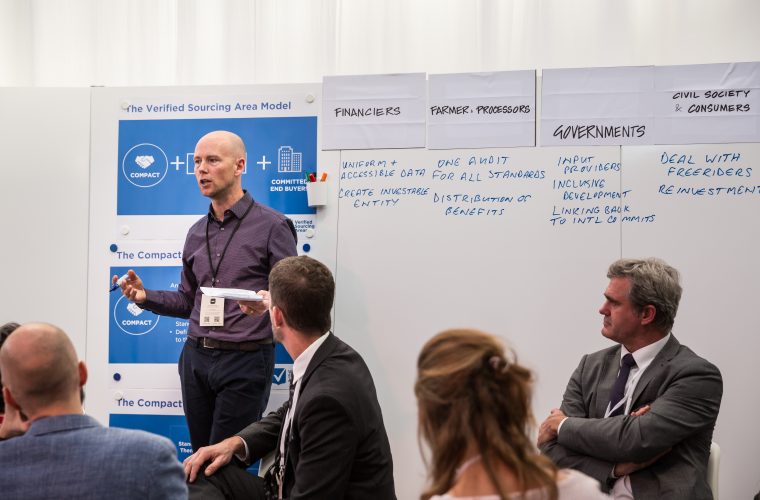

Speakers who joined this session :
Innovation Lab I - IDH4Gender: Where does the evidence takes us?
Key insights
During the Innovation Lab on gender, IDH and partners shared their experiences in working towards integrating gender, what has worked and what hasn’t and explored practical integrated gender business solutions. The session kicked off with three inspirational talks from Vicki Wilde (Bill & Melinda Gates Foundation), Tewodros Zewdie, (EHPEA) and Winfridah Nyakwara (Unilever). They ignited meaningful conversations amongst the four break-out groups, which each focused on a different aspect of gender equality in the business: service provision, access to finance, workplace safety and female leadership. Three cross-cutting messages came out from the break-out groups. Firstly, to ensure female leadership in supply chains we have to bring women to a level where they can compete. Therefore, investing capacity and skills-building for women is key. Secondly, management commitment and buy in is key for the success of any gender equality program, as is the involvement of men: companies can appoint role models as well as male champions in the workforce and communities. Thirdly, there is a clear need to gather data, to prove what works and what doesn’t work, but also to further design and monitor gender interventions. Data is context specific, but better methods of data gathering can also help in making the business case for integrated gender business solutions. As one of the speakers mentioned: “investing in gender equality is not rocket science, but takes intention, leadership and commitment”.
As follow up from the session, IDH aims to continue to facilitate these cross-sector learning conversations, and we will further work with and support our partners in effective data gathering on gender, through amongst others the piloting of the Gender Tool. A tool to further explore and understand gender dynamics in our smallholder service delivery work, allowing us to conduct a gender analysis inhouse and to provide future recommendations for integrating gender.





Speakers who joined this session :
-

Olga Gormalova
General Manager - Sustainable Management Services (Ghana and Nigeria) at ECOM
-

Winfridah Moraa Nyakwara
Integrated Social Sustainability Manager, Africa for Unilever
-

Vicki Wilde
Senior Program Officer, Agricultural Development and Women's Economic Empowerment, Bill & Melinda Gates Foundation
Collaborative Transformation - Book Launch


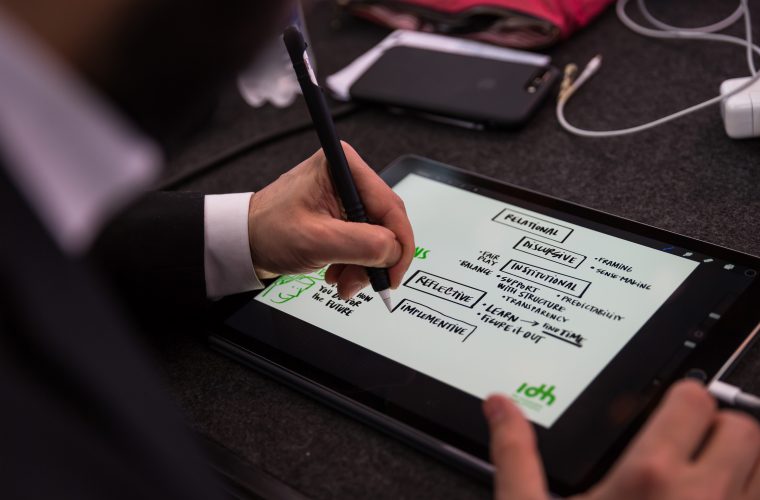




Closing Ceremony






























